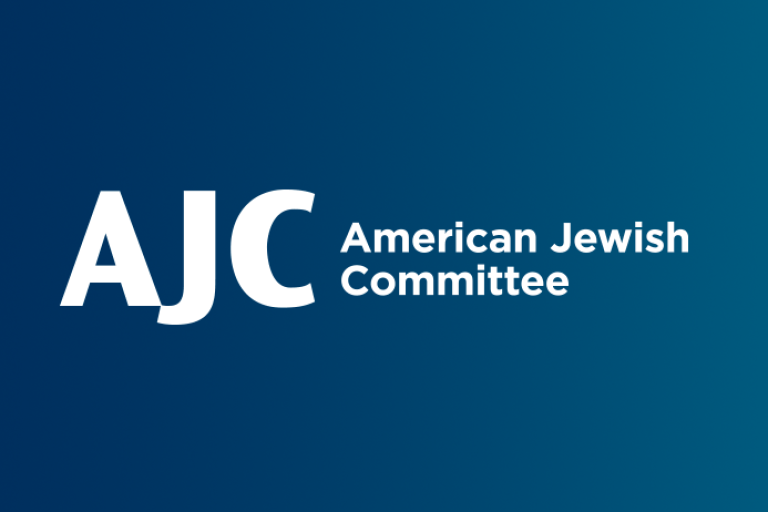April 11, 2012
April 11, 2012 – Washington – An AJC survey of Latinos in the United States shows that only 18 percent are highly familiar with Jews, while 31 percent are not familiar with them at all. However, in an encouraging sign for future Latino-Jewish relations, the survey also found that more positive views in the Latino community about Jews on a wide range of issues tended to correlate with frequency of personal contacts, and levels of education, income and acculturation.
“This comprehensive, insightful survey will inform and advance our ongoing efforts to engage Latino communities, form coalitions, and deepen understanding of American Jews and Israel,” said Dina Siegel Vann, director of AJC’s Latino and Latin American Institute.
Latino Decisions, a nationally recognized firm with expertise in the Hispanic community, was commissioned by AJC to survey the diverse Latino community, now 16 percent of the U.S. population, and provide insights into the thinking of this rapidly growing ethnic minority, the results broken down by country of origin, immigration wave, education, income, religion and U.S. city of residence.
“On the whole, we find Latinos hold many positive views about the Jewish community,” Latino Decisions concluded in its report on the AJC survey, the largest and most comprehensive of its kind ever undertaken. “At the same time, Latino opinions are hampered by limited contact and general unfamiliarity with Jews.”
The main point of contact, where 45 percent of all Latino-Jewish interaction occurs, is the workplace, whether as colleagues or in employer-employee relationships. “Interpersonal connections are of the essence, particularly since Latino culture stresses trust and loyalty in the creation of substantive, long-term professional and political alliances,” said Siegel Vann.
Beside personal contact, other key factors influencing knowledge about Jews include education, income, immigration wave and country of origin.
- While 50 percent of those without a high-school education have zero familiarity with Jews, 38 percent of college graduates have the highest rate of familiarity.
- Fifty percent of Latinos with annual incomes over $80,000 have established relationships with Jews. Among Latinos with annual incomes under $40,000, 41 percent have no contacts with Jews.
- Familiarity with Jews increases among children and grandchildren of immigrants.
- 38 percent of first-generation immigrants have no contact, 19 percent have low levels of contact, 29 percent medium levels, and 14 percent high levels of contact.
- Among the second generation, 28 percent have a high rate of contact, and only 12 percent have no contact.
- 31 percent of the third generation have high contacts, and ten percent none.
- 38 percent of first-generation immigrants have no contact, 19 percent have low levels of contact, 29 percent medium levels, and 14 percent high levels of contact.
While the survey found varied levels of knowledge about the Jewish community, it also confirmed that most Latinos hold positive views of Jews, especially on issues of concern to the Latino community.
A large majority of Latinos think Jews are committed to faith, family and social change, all values important to the Latino community.
- Two-thirds of Latinos think Jews have a strong faith in God. Only 14 percent disagreed and 21 percent did not know.
- 78 percent said that Jews are committed to family life. Only 5 percent disagreed and 14 percent did not know.
- 61 percent believe Jews make positive cultural contributions to the U.S, 17 percent disagree and 22 percent did not know.
- 53 percent agree that Jews are pro-civil rights, and 29 percent did not know.
Also contributing to the positive outlook is the fact that Latinos, like Jews, favor retaining their own cultural distinctiveness as they integrate into American society. Sixty-three percent said they have a strong Latino identity, and 42 percent also report having a strong American identity. When asked about “Jewish assimilation” in the U.S., only a minority of Latinos said Jews are losing their distinctiveness.
Another positive shared attribute is group attachment, an important factor because Latinos have high rates of group attachment and identity. Sixty-five percent said it is probably or certainly true that Jews stick together more than other Americans, while 16 percent said it is probably or certainly false.
“Latinos, many of whom maintain close ties to their respective countries of origin, admire the American Jewish connection to Israel,” said Siegel Vann, “The Latino and Jewish communities are models for enriching U.S. society by expressing multiple identities.”
The survey also explored Latino perceptions of Jewish power.
- On Jewish influence in the U.S, 42 percent said it is “probably untrue” or “certainly untrue” that Jews have too much power in the U.S., 38 percent said it is “probably true” or “certainly true,” and 20 percent did not know. The findings varied by degree of familiarity, with 57 percent of those most familiar with Jews saying the statement is false.
- On the media, the survey asked if “the movie and television industries are pretty much run by Jews,” 44 percent said the statement is true, 31 percent false and 25 percent did not know.
- 48 percent said Jews have too much power on Wall Street
These perceptions of Jewish influence in business, Hollywood and the media are not necessarily negative, Latino Decisions observed, but may instead reflect frustrations among Latinos who have not yet enjoyed much access in these professions.
Overall, the survey found a substantial lack of knowledge in the Latino community about Jews and Jewish concerns. Responses to questions about Jewish faith and influence in American society indicated that more work is needed to deepen understanding.
- 63 percent of Latinos say they know little or nothing at all about the Jewish faith.
- When asked if Jews are responsible for the death of Jesus, 30 percent said yes, 41 percent no and 29 percent did not know. As with most other questions, responses were more positive among Latinos who are more familiar with Jews. For example, 50 percent of college-educated and more affluent Latinos disagree that Jews are responsible for Jesus’ death, but another 50 percent agree or do not know.
“These findings challenge us in the Jewish community to step up efforts to ensure that Latinos understand Jewish history and Catholic rejection of the deicide charge,” said Siegel Vann.
On questions regarding Israel and foreign affairs, the “don’t know” responses were highest. This was not surprising since Latinos tend to focus on domestic issues, especially immigration, rather than foreign policy.
- The survey found only limited Latino familiarity with the Israeli-Palestinian conflict. Sixty percent did not know who is responsible for the conflict, 15 percent said it was the Palestinians’ fault, 12 percent blamed both parties, 9 percent said it was Israel’s fault, and 3 percent responded that neither was at fault.
“Latinos engaging U.S. foreign policy issues will develop as the community becomes more involved politically in the U.S.," said Siegel Vann. “U.S. policies on immigration, trade, and security have a direct impact on Latino interests.”
Latino Decisions conducted the AJC survey of 2,000 Latinos by telephone from August 12 to Sept 16, 2011, in Chicago, New York, Miami, Los Angeles and Kansas City, Missouri, and held follow-up discussions with focus groups during November and December.
The AJC survey, unlike other studies to date, examined the extent to which Latinos subscribe to both positive and negative stereotypes about the Jewish community. Academic studies have shown that surveys testing and reporting only favorable or unfavorable views frequently overstate the pessimistic or optimistic nature of public opinion. By considering both aspects, a more nuanced view emerges of paths to collaboration and avenue where barriers are present.


